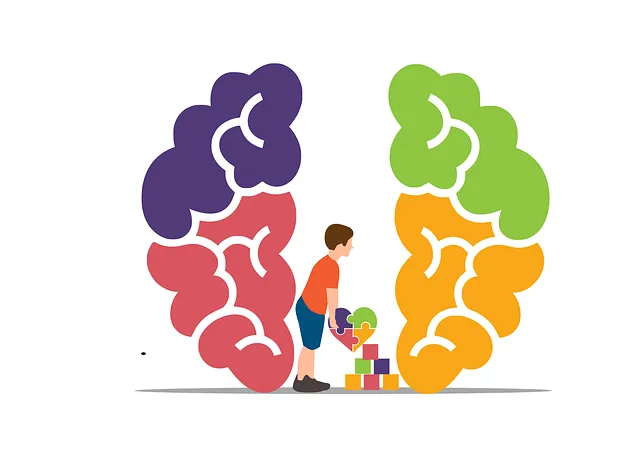Cultural competency is a key driver of high-quality care at Kaiser Permanente's mental health facility in Castle Rock, serving a diverse community. Through programs like Inner Strength Development, staff learn communication strategies to bridge cultural gaps and create safer spaces for patients. This approach enhances satisfaction and improves outcomes, especially crucial in mental health services. Kaiser Permanente Castle Rock leads the way with comprehensive, interactive training, empowering healthcare providers to offer personalized, culturally sensitive care, including effective stress management techniques tailored to diverse needs. Continuous evaluation ensures these programs remain responsive and successful.
Healthcare provider cultural competency training is an essential framework for delivering equitable care. In today’s diverse society, understanding cultural nuances is vital to address healthcare disparities. This article explores a model program at Kaiser Permanente Castle Rock, showcasing how mental health facilities can foster cultural competency. We delve into key components of effective training, strategies for measuring impact, and continuous improvement tactics. By learning from innovative approaches like Kaiser Permanente’s, healthcare organizations can better serve their communities.
- Understanding Cultural Competency in Healthcare: A Necessary Framework
- Kaiser Permanente Castle Rock: A Model for Mental Health Facility Training
- Key Components of Effective Cultural Competency Programs
- Measuring Impact and Continuous Improvement Strategies
Understanding Cultural Competency in Healthcare: A Necessary Framework

Cultural competency is a vital framework within healthcare, ensuring providers can offer quality care that respects and values diverse cultural backgrounds. In a region like Castle Rock, where Kaiser Permanente mental health facility serves a diverse community, understanding different cultural perspectives becomes essential. This concept goes beyond simple awareness; it involves recognizing and appreciating the impact of culture on individuals’ experiences, beliefs, and behaviors related to healthcare.
At Kaiser Permanente, training programs, such as those focused on Inner Strength Development, aim to equip staff with communication strategies that bridge cultural gaps. By learning about emotional healing processes from various cultural contexts, providers can create safer spaces for patients to express themselves honestly. This approach not only improves patient satisfaction but also fosters better outcomes, especially in mental health services where trust and understanding are paramount.
Kaiser Permanente Castle Rock: A Model for Mental Health Facility Training

Kaiser Permanente Castle Rock stands as a remarkable model for mental health facility training, showcasing how comprehensive programs can revolutionize patient care. This facility emphasizes the importance of cultural competency within healthcare, ensuring staff are equipped to address the diverse needs of their community. By implementing innovative mental health education programs design, they foster an environment that promotes mental wellness and effective stress management techniques.
The approach at Castle Rock goes beyond traditional training methods, offering hands-on experiences and interactive workshops that prepare professionals for real-world scenarios. This immersive learning allows healthcare providers to develop cultural sensitivity, improve communication skills, and gain a deeper understanding of various therapeutic practices. As a result, patients receive more personalized and culturally responsive mental health services.
Key Components of Effective Cultural Competency Programs

Effective cultural competency programs in healthcare settings, such as those offered at Kaiser Permanente’s mental health facility in Castle Rock, typically incorporate several key components. First and foremost, these programs emphasize the importance of understanding and appreciating diverse cultural backgrounds, beliefs, and values among patients and their families. Training should equip healthcare providers with the skills to recognize and respect these differences, fostering an environment where every individual feels heard and understood.
Moreover, successful initiatives focus on enhancing cross-cultural communication skills. This includes active listening, clear and concise language, and adapting communication styles to suit diverse needs. By learning effective stress management techniques and mental wellness promotion strategies, healthcare professionals can better address the unique challenges faced by culturally diverse populations, ensuring that services are tailored to individual needs. Incorporating evidence-based stress reduction methods, for instance, can significantly contribute to improving patient outcomes and overall satisfaction at facilities like Kaiser Permanente’s Castle Rock location.
Measuring Impact and Continuous Improvement Strategies

Evaluating the effectiveness of cultural competency training is a pivotal step in ensuring its long-term success. Organizations like Kaiser Permanente’s mental health facility in Castle Rock can utilize various methods to measure the impact, such as pre and post-training assessments, participant feedback, and observational studies. These evaluations should assess not only knowledge gain but also behavioral changes and improved patient outcomes. For instance, tracking the implementation of self-care routine development for better mental health among trained staff can provide valuable insights into the program’s real-world application and effectiveness.
Continuous improvement is integral to enhancing cultural competency over time. Based on evaluation results, facilities can adapt their training programs, integrate new research findings, and incorporate feedback from both participants and beneficiaries. Developing public awareness campaigns that highlight the benefits of cultural competency and mental health policy analysis and advocacy can further drive systemic change. Such strategies ensure that the initiative remains responsive to evolving needs, fostering an inclusive environment that benefits both patients and healthcare providers at Kaiser Permanente’s Castle Rock facility and beyond.
Cultural competency training in healthcare, as exemplified by Kaiser Permanente’s innovative program at their Castle Rock mental health facility, is a vital step towards providing equitable care. By understanding cultural nuances and integrating them into practice, healthcare providers can significantly improve patient outcomes and experiences. Key components of effective programs include comprehensive curriculum, ongoing measurement, and adaptive strategies for continuous improvement. This approach not only enhances the quality of care but also fosters a more inclusive and respectful healthcare environment, reflecting the diverse communities we serve.






